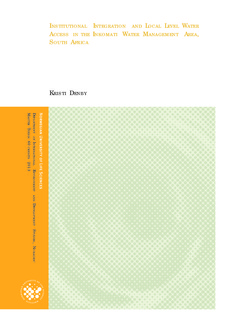| dc.description.abstract | This paper explores how the degree of integration and cooperation among water and agricultural institutions affects local level water access for small-scale and emerging farmers in South Africa. The South African post-apartheid National Water Act (NWA) adopted the principles of Integrated Water Resources Management (IWRM) with a focus on equity, efficiency and sustainability. This research explores themes related to governance and integration; and water rights and access. The paper utilizes the Inkomati Water Management Area as a case study to examine how the processes and dynamics of institutional integration and co-operation affect ‘on-the-ground’ water access. The paper examines the parallel processes of water and land reforms from the basin level to the local level. In addition, the paper highlights the many challenges and obstacles communal and land reform farmers face in accessing water. Methods included a review of relevant policy documents and literature, semi-structured interviews with key managers and employees of both water and agricultural institutions, attendance at important meetings and forums, and participatory observation at the basin and local level. The research showcases the flaws in institutional integration, and the majors challenges related to issue based communication, non-alignment of mandates, top down silos, and the low incentives to collaborate. Key findings include that the lack of institutional legitimacy and integration has contributed to challenges in local level water access, confusion among farmers about the relevant mandates of different institutions, and flawed participation. Perceptions of what actually fulfills integration are consistent with that of the subjective nature of IWRM. In examining the challenges in the integration, I argue governments and the people must specifically outline and define what coordination, cooperation and integration means for that specific context and with consideration of local realities. In addition funds and incentives must be put in place to avoid silos, and integration must be monitored and enforced to improve local level water access.
Key words: Integration, water access, IWRM, governance, silos, participation, water rights. | no_NO |
